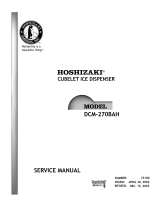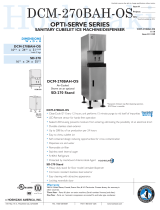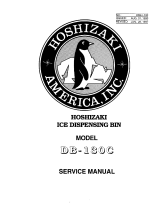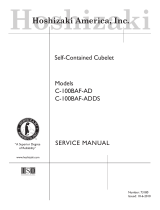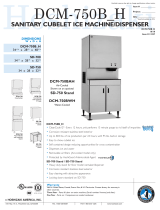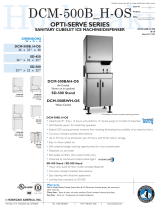
19
8) Remove the front panel, top panel, and bin top.
9) Pour clean, warm water into the storage bin and melt any remaining ice.
10) Remove the louver and air lter. Plug the icemaker back in. Move the control switch to
the "DRAIN" position, then move the power switch to the "ON" position. Allow the water
system to drain completely.
11) Move the power switch to the "OFF" position, then unplug the icemaker.
5. Sanitizing Procedure - Final
1) Make sure the power switch is in the "OFF" position, the icemaker is unplugged, and
the water supply line shut-off valve is closed.
) Remove the agitator. Pour the sanitizing solution over the extruding head until the
evaporator assembly and the reservoir are full and the solution starts to overow into
the drain pan. Allow the icemaker to soak for about 10 minutes before operation.
3) Move the control switch to the "ICE" position. Replace the air lter, louver, agitator, bin
top, and panels in their correct positions.
4) Plug the icemaker back in. Move the power switch to the "ON" position. Make ice using
the solution until the icemaker stops making ice.
5) Move the power switch to the "OFF" position, then remove the louver and air lter.
Move the control switch to the "DRAIN" position, then move the power switch to the
"ON" position. Allow the water system to drain completely.
6) Move the power switch to the "OFF" position, then unplug the icemaker.
7) Remove the front panel, top panel, and bin top.
8) Pour clean, warm water into the storage bin and melt any remaining ice. Remove the
agitator. Pour clean, warm water over the extruding head until the evaporator assembly
and the reservoir are full and the water starts to overow into the drain pan. Plug the
icemaker back in, then move the power switch to the "ON" position. Allow the water
system to drain completely.
9) Move the power switch to the "OFF" position, then unplug the icemaker.
10) Move the control switch to the "ICE" position. Replace the air lter, louver, agitator, bin
top, and panels in their correct positions.
11) Open the water supply line shut-off valve to supply water to the reservoir. Move the
power switch to the "ON" position to start the automatic icemaking process. Allow the
icemaker to run for about 30 minutes.
1) Move the power switch to the "OFF" position, then remove the louver and air lter.
Move the control switch to the "DRAIN" position, then move the power switch to the
"ON" position. Allow the water system to drain completely.
13) Dispense all of the ice from the storage bin.
14) Move the power switch to the "OFF" position, then unplug the icemaker.
15) Remove the front panel, top panel, and bin top. Remove the agitator and drip ring.
16) Wipe down the inside of the storage bin, inside of the bin top, the agitator, and drip ring
with a clean cloth.





















